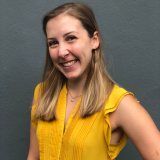
Necessity is the mother of invention. Accordingly, these physicians’ healthcare-related inventions came out of specific needs — those of their patients and their own, as women juggling motherhood and medical practice.
For all of them, the motivation to make their invention a reality was that it had the potential to help their patients.
Dr. Heather Hammerstedt, an Emergency Medicine physician realized that while she and her colleagues were doing an “excellent job in acute cute…fixing people’s pneumonia and broken bones and heart attacks,” there were other problems they weren’t addressing. They weren’t doing any sort of preventive care. She didn’t blame her fellow doctors — however, she only learned about 30 minutes of nutrition information in medical school — but she knew that food, exercise, and sleep were critical factors for preventing and even reversing some diseases.
So she got to work creating Wholist, a network of practitioners that could work together to share information about the clients, with the hope to improve outcomes. The idea came to her after watching her friends struggle to try to figure out their care, and then when she herself was being told different things by her acupuncturist and physical therapist.
A similar rationale prompted urologist Dr. Dana Rice to create the app UTI Tracker. She was writing a chapter in a textbook when she realized how scattered information was for urinary tract infections (UTIs). The issue came into sharper focus when she looked closely at the number of women who get UTIs — including herself, both as a child and an adult; her daughter; and many of her patients.
“I give the same speech over and over and over again, so I basically wanted to include that in the app, in an education center,” says Dr. Rice. She got to work gathering information and devising a way for parents and patients to track their symptoms. She was trying to find a way to make the app useful both for patients, by providing information, and for clinicians, by decreasing the time it would take to explain the risks and symptoms of UTIs, as Dr. Rice so often found herself doing.
While Dr. Rice aimed to educate, Dr. Shannon Klingman, an OBGYN, wanted to decrease incorrect diagnoses with Lum_, a deodorant for underarms and private parts. After seeing how many patients were being sent away with antibiotics to treat bacterial vaginosis, Dr. Klingman had a hunch that not all of them were not correctly diagnosed. For some, their problem was simply that they had an external odor in reaction to normal daily activities. Dr. Klingman was familiar with women coming in complaining of the odor, and she realized she herself was experiencing the symptom one day at work, around the time she and her husband were trying to conceive.
“I knew I didn’t have BV (bacterial vaginosis) and I said, ‘This is an external odor,’” Dr. Klingman remembers.
Every Entrepreneur Encounters Roadblocks
In the case of each invention, these physicians realized that they were experiencing something that their patients were struggling with and created a solution to the issue.
But that’s not to say that being an innovator and entrepreneur comes easily.
For Dr. Hammerstedt’s Wholist app aiming to improve communication across a care team, navigating the world of telemedicine is turning out to be a problem she didn’t anticipate. Each doctor needs to have a license in the state where the patient is located in order to treat them.
“The part that gets really complicated with any kind of telemedicine is figuring out where your biggest bang for your buck is in terms of marketing and who is where [in terms of licensing],” says Dr. Hammerstedt.
Another issue she is running into is how to balance physician compensation with user subscription prices. “Trying to figure out what everyone is worth without it becoming too cost-prohibitive for the patient, because most of these services are not covered by insurance,” Dr. Hammerstedt explains.
Dr. Rice had a different issue: navigating the legal aspects of online medical information, intellectual property and privacy clauses.
“People may take an app written by a doctor as advice, and then try to turn it on you, like you gave them bad advice,” says Dr. Rice. “That kind of stuff I would never have thought about.”
While the learning of legal issues came from the advice of a lawyer, some of the best advice given to these physician entrepreneurs has come from other female physician entrepreneurs, who have blazed the trail before them. The support for each other is phenomenal on Facebook, of all places, says Dr. Hammerstedt.
The Importance of a Support System
“It’s pretty amazing how many women are out there doing something that’s different,” says Dr. Hammerstedt. “And the fact that I can hop on Facebook and be like, ‘I’m struggling with this’ or ‘Someone look at this and tell me what they think’ or ‘Who did something like this and who has someone they can suggest to me?’ The fact that there are virtual women out there who support each other like this is just really awesome.”
And while all three entrepreneurs agree that having a support system is imperative, Dr. Klingman is the only who has taken the full leap out of medicine to pursue her product full-time.
For her, having a support system means having a spouse that can help shoulder the burden of finance and family. “He’s an OBGYN as well, so I really didn’t need to worry so much about where the roof was going to come from, and I didn’t feel like I was going to completely pull the rug out from underneath my children’s lives,” says Dr. Klingman.
Furthermore, she says, it’s imperative to have a team of supportive, trustworthy and competent coworkers. “Know the things you’re good at and do those things, then outsource the things you’re not as good at,” Dr. Klingman explains. “You always have to keep your hand on the wheel, you are the captain of the ship. You have to be able to trust the instincts of the people that you surround yourself with and you really need to know that this was your idea. It is your invention.”
Dr. Rice echoes that advice — never think you can do it all yourself. “The minute as a surgeon” — or as an entrepreneur — “you assume you can do anything is when you’re going to make a mistake. You’re not God. You’re not the end-all, be-all. There’s always somebody who can be better, so stay humble, pay attention, and be prepared for anything because the minute you’re overconfident, you’re going to get yourself in trouble.”
And though she has since left practice, Dr. Klingman has also found her medical training to be useful. “I think that the reason I went to medical school and did my residency was to prepare me for these moments right now. There’s no way I would’ve been able to invent this product without having that training,” Dr. Klingman says.
Be All In
While Dr. Klingman is the one of the furthest along in her journey — Dr. Hammerstedt just launched her website, Dr. Rice’s app launched its most current version in 2017, and Dr. Klingman launched in October and has already done two million in sales — all three are driven by the same thing: passion for their idea. Which they also say is the best piece of advice they can give to others: be all in on your idea.
“You have to love your idea. You have to be fully committed to the excitement of it because there are long days and long nights where you are doing very tedious things that you do not think are interesting but are for the bigger picture,” says Dr. Hammerstedt.
As for the answer to the question of how do these female physician entrepreneurs have time to think of ideas when they’re balancing everything else?
Dr. Hammerstedt thinks it’s because women get passed over elsewhere.
“We still get overlooked as physicians. Every day I have a patient complain that they never saw a doctor, ‘but, that blonde nurse sure seemed like she knew a lot!’” says Dr. Hammerstedt. “We work on a lot and I think that is why we are able to step out of the box and do so many interesting things because we have had to be standing up for ourselves all this time to get where we are.”






